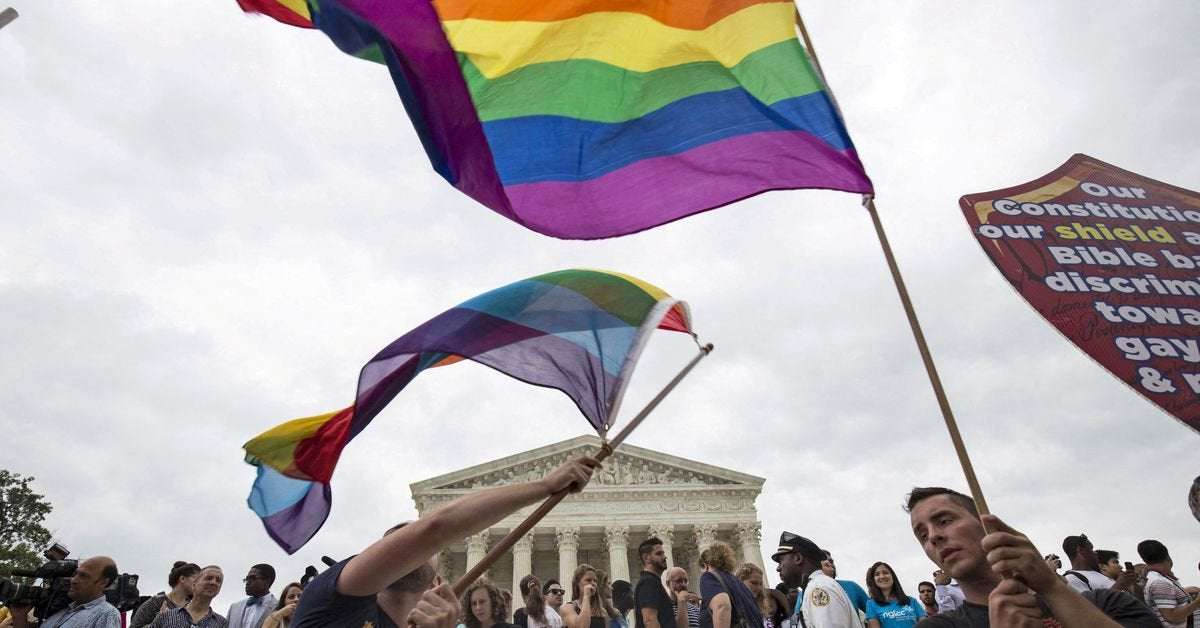[1/2] Supporters of gay marriage wave the rainbow flag after the U.S. Supreme Court ruled that the U.S. Constitution provides same-sex couples the right to marry at the court building in Washington June 26, 2015. REUTERS/Joshua Roberts/File Photo
WASHINGTON, Dec 6 (Reuters) - Passage of a bill protecting federal recognition of same-sex marriages that has the support of both LGBT advocates and religious groups, has been delayed in the U.S. House of Representatives.
The bill was initially expected to be debated and passed by the full House on Tuesday. It is now expected to be attached to an unrelated defense bill that is still under discussion by House and Senate negotiators.
Lawmakers are weighing attaching a few such unrelated measures to the defense bill as Democrats rush to pass as many bills as possible before Republicans take majority control of the House on Jan. 3.
The bill, which passed the U.S. Senate last week, was designed as a backstop to the 2015 Supreme Court ruling that legalized same-sex marriage nationwide, known as Obergefell v. Hodges.
The legislation would allow the federal government to continue recognizing same-sex and interracial marriages in states where they were legally performed, should the court strike down Obergefell, a concern raised after the court ended the nationwide right to abortion in June.
A bipartisan amendment added in November affirmed that the bill would not subvert existing religious freedoms, helping quell initial opposition by conservatives. The bill, which was spearheaded by a group of Democratic and Republican senators, gained the backing of several national religious groups.
Paul Brandeis Raushenbush, an American Baptist reverend and president of Interfaith Alliance, said the support for the bill from religious groups showed that many had undergone a "remarkable transformation" in the way they perceive same-sex marriage.
He attributed the shift partly to the fact that such marriages had ceased to be unusual in the United States since the Supreme Court legalized them.
"The sky didn't fall because same-sex marriage began happening," said Raushenbush, who is in a same-sex marriage himself. "The specter of same-sex couples getting married no longer feels scary because it's quite commonplace."
The amendment's support from various religious groups that are theologically opposed to same-sex marriage reflects the fact that attitudes have changed, said Tim Schultz, the president of the 1st Amendment Partnership, which advocates for religious liberty.
"Fighting a permanent culture war over gay rights is not in their interest as religious organizations," he said. "They believe that seeking common ground is in the interest of religious freedom, the common good and how they portray their faith to the world."
Other religious groups, such as the Southern Baptist Convention, strongly opposed the legislation even after the religious freedom protections were added.
“The ability of (Baptist) organizations to follow their consciences as they carry out their work has already been a source of conflict,” Brent Leatherwood, president of the convention’s Ethics and Religious Liberty Commission, said. “Those waters will only be further muddied by [the law].”
Several conservative senators pushed back against this characterization of the bill, which ultimately received support from a dozen Republicans.
The legislation "offers far more in the way of religious liberty protections than currently under Obergefell, which leaves all such decisions up to the courts," Republican Senator Todd Young wrote in a newspaper opinion piece declaring his support for the bill last week.
The vote comes the day after the Supreme Court appeared ready to rule that a Christian Web designer has the right to refuse to provide services for same-sex marriages, in arguments challenging a Colorado law banning discrimination.
Reporting by Moira Warburton in Washington, Julia Hart and Joseph Ax in New York Editing by Scott Malone, Matthew Lewis and Alistair Bell
Our Standards: The Thomson Reuters Trust Principles.

GarysCrispLettuce on December 6th, 2022 at 12:51 UTC »
This "shift in attitudes" is why conservatives are fighting their imagined "culture war" so frantically. They realize the walls are closing in on their backward 19th Century agenda of pig ignorance. The attitudes of hatred and intolerance that have fueled them for decades are slowly phasing out and Gen Z and Millennials are overtaking boomers as a voting block and they're more liberal and tolerant than any other generation before them. Man, the future is BLEAK for Republicans. They're either going to have to drastically rethink their attitudes, or face continual election loss.
CrudQuest on December 6th, 2022 at 12:25 UTC »
Well, they better hurry! If it doesn't get done in the lame-duck session, the country will be listening to the new national security threat of Hunter Biden's laptop. On a more optimistic note, maybe we won't have to hear any more about Hilary's emails or Benghazi.
TheMightyRaisin on December 6th, 2022 at 11:51 UTC »
I seriously don't know how anyone with a heart could vote against this bill